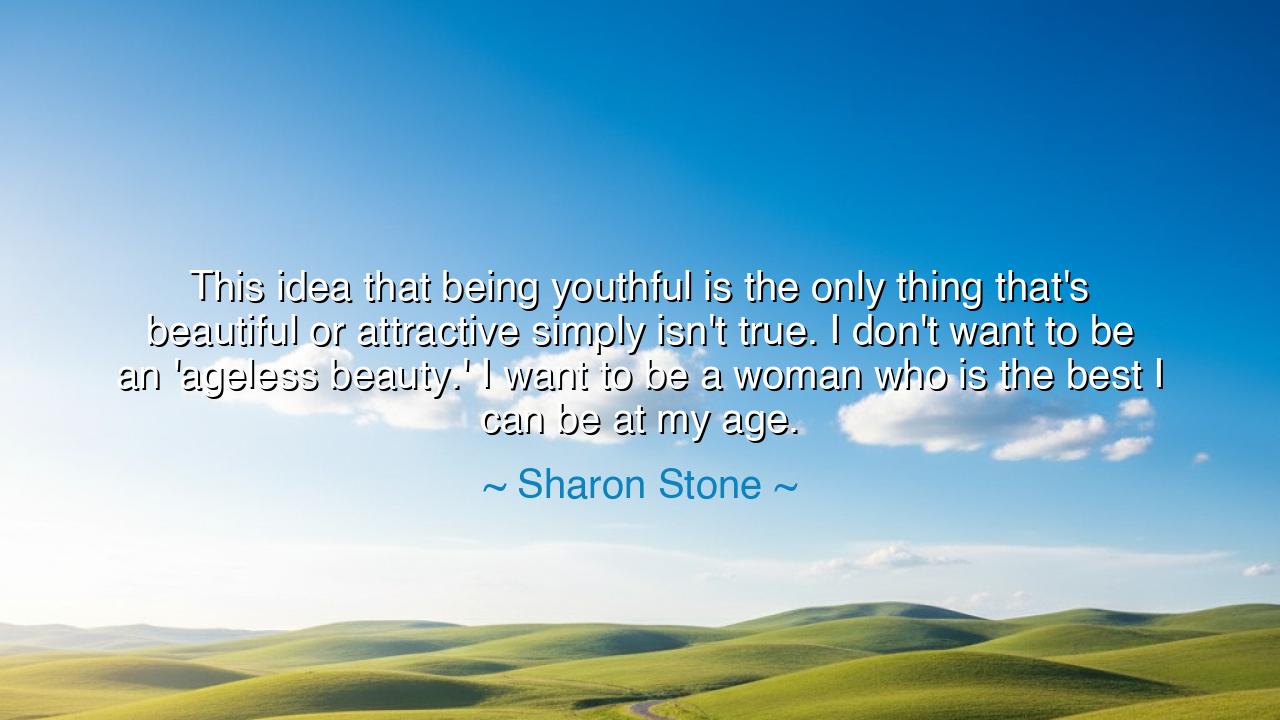
This idea that being youthful is the only thing that's beautiful
This idea that being youthful is the only thing that's beautiful or attractive simply isn't true. I don't want to be an 'ageless beauty.' I want to be a woman who is the best I can be at my age.






In the vast story of humanity, where the cycle of life, from the birth of youth to the wisdom of age, plays out before our eyes, there arises a powerful truth: beauty is not a fleeting thing bound solely to the youthful. Sharon Stone, in her profound statement, "This idea that being youthful is the only thing that's beautiful or attractive simply isn't true. I don't want to be an 'ageless beauty.' I want to be a woman who is the best I can be at my age," speaks to the very heart of the human experience—age is not a curse, nor is it something to fear, but a blessing, a time for growth, and transformation. The beauty that Stone speaks of is not one defined by external appearance but by the grace, wisdom, and strength that comes from living fully at each stage of life.
The ancients understood the concept of beauty in a way that transcended the superficial. The Greeks, who were famed for their sculptures of gods and heroes, saw beauty as a reflection of balance and harmony. They celebrated the ideal form, not just in youth but in the mature strength and wisdom that could only be gained through time. Consider the image of Athena, the goddess of wisdom, who was not only revered for her physical beauty but for her strength of character and intellect, qualities that came from a lifetime of wisdom. The Greeks knew that true beauty was not fleeting like youth, but enduring, like the timelessness of the gods themselves. In this light, Stone’s desire to be the best version of herself at her age echoes the ancient understanding that beauty is something that grows deeper and more radiant with time.
Similarly, the Romans, who were deeply focused on virtues such as dignity and honor, recognized that the beauty of an individual was defined not by their appearance but by their character. Cicero, the great Roman statesman, believed that a life lived with integrity and honor was far more valuable than any youthful beauty that could be admired from a distance. As the Romans celebrated the achievements of their leaders, they looked not at how young or beautiful someone appeared but at the wisdom and strength they had accumulated over their years. In the same way, Stone’s words remind us that the beauty of a woman—like the glory of the great Roman Empire—is not defined by the passing years but by the impact she makes, the legacy she leaves, and the depth she brings to her own life.
Consider the example of Queen Elizabeth I of England. Though she was hailed as one of the most powerful and charismatic rulers in history, she was also known for her refusal to acknowledge the physical toll that age took on her body. As her years advanced, Elizabeth understood that her power lay not in youthful beauty, but in her sharp mind, charisma, and unyielding resolve. She famously declared, "Though I be but a woman, I have the heart and stomach of a king," recognizing that her beauty—and her true strength—was rooted in her leadership, her wisdom, and her ability to rule with integrity. In this sense, Elizabeth embodies the timeless beauty that Stone speaks of—a beauty that is earned, honed, and refined over time, not a transient appearance that fades with age.
The lesson that Stone imparts is one of acceptance, empowerment, and growth. To chase after an ideal of ageless beauty, as society often demands, is to miss the deeper, more profound truth of life’s journey. The belief that youth is the only time when one can be beautiful or worthy denies the power and wisdom that each new phase of life brings. Stone’s call is not to abandon the pursuit of beauty, but to embrace it in its most authentic form, one that is based on self-acceptance, inner strength, and the desire to live fully at each age. Beauty is not something to be fixed in time but something that evolves, just as the seasons change and the earth itself grows older, wiser, and richer in its experiences.
For us, the lesson is clear: true beauty is not tied to youth or appearance, but to the depth of experience, the richness of character, and the integrity we cultivate throughout our lives. Just as Athena, Cicero, and Elizabeth I exemplified, beauty is something that deepens with time, not because of external perfection, but because of the life we live and the lessons we learn. In a world that often seeks to define beauty through narrow lenses, we must choose to redefine it for ourselves.
Practical action calls us to embrace age with grace, to celebrate the wisdom and strength that come with the years we live, and to reject the pressure to conform to superficial ideals. Let us invest in our inner beauty—in our character, our passions, and our relationships—with the same care and attention we give to our external selves. Let us challenge the notion that beauty is something that fades, and instead see it as something that grows, evolves, and becomes more meaningful with every passing year. As Sharon Stone wisely declares, let us all strive to be the best version of ourselves at each age, cultivating a beauty that is timeless, powerful, and enduring.






AAdministratorAdministrator
Welcome, honored guests. Please leave a comment, we will respond soon